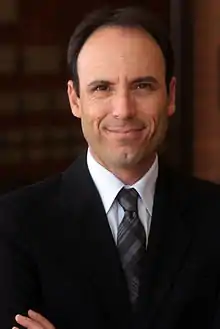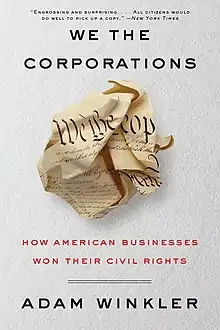Adam Winkler
Adam Winkler (born July 25, 1967) is the Connell Professor of law at the UCLA School of Law. He is the author of We the Corporations: How American Businesses Won Their Civil Rights,[1] which was a finalist for the 2018 National Book Award for Nonfiction.[2] He has been ranked as one of twenty most cited legal scholars in judicial opinions, including landmark Supreme Court cases on the First and Second Amendments.[3][4] He is also the author of Gunfight: The Battle over the Right to Bear Arms in America,[5] and is a frequent commentator on legal issues.
Adam Winkler | |
|---|---|
 Adam Winkler | |
| Born | July 25, 1967 Los Angeles, U.S. |
| Occupation | Attorney Law professor |
| Parent(s) | Irwin Winkler |
Early life and education
Winkler, born and raised in Los Angeles, is the youngest son of Academy Award-winning film producer Irwin Winkler. As a child, he had small acting parts in movies, including appearing as the son of Robert De Niro and Liza Minnelli in Martin Scorsese's New York, New York (1977). He holds a Bachelor in the Science of Foreign Service from Georgetown University's School of Foreign Service, a Juris Doctor from New York University School of Law, and a Master's degree in political science from UCLA where he studied under Karen Orren.[6]
Professional career
Winkler served as a law clerk to judge David Thompson of the U.S. Court of Appeals for the Ninth Circuit from 1995-96. As a young lawyer, Winkler practiced with prominent trial lawyer Howard Weitzman and represented Michael Jackson in his defense against charges of sexual assault.[7]
He has taught at UCLA School of Law since 2002,[7] receiving tenure in 2007. Prior to joining the faculty at UCLA, he was the John M. Olin Fellow at the University of Southern California Law School from 2001-02.
Scholarship

Winkler is a nationally recognized expert on American constitutional law. His most recent book We the Corporations: How American Businesses Won Their Civil Rights,[1] was a finalist for the 2018 National Book Award for Nonfiction, the National Book Critics Circle Award, the American Bar Association's Silver Gavel Award, the California Book Award, and received the Scribes Book Award. The book chronicles the astonishing story of one of the most successful yet least well-known “civil rights movements” in American history. Uncovering the roots of Citizens United v. FEC, Winkler shows how that controversial Supreme Court decision was the capstone of a two-hundred-year struggle over corporate personhood and constitutional protections for business. The book brings to life the legendary lawyers and justices involved in the dramatic yet often overlooked cases that extended our most fundamental rights to corporations—Daniel Webster, Louis Brandeis, Stephen Field, and even Thurgood Marshall—and reveals how the nation’s most powerful companies transformed the Constitution into a bulwark against the regulation of big business and a tool to serve the ends of capital.[8] On We the Corporations, Zephyr Teachout in a New York Times Sunday cover book review said “Winkler’s chief contribution is to show how corporations have been some of the most important innovators in American law, shaping it for good and often ill.”[9] Another review by Vox held “it is deeply shocking that We the Corporations is not boring”[10] and United States Supreme Court Justice Stephen Breyer was quoted as saying "it is a good book."[11]
Winkler's writing on the right to bear arms, which is notable for nuanced position—recognizing both the individual right to possess firearms and the legitimacy of effective gun control—has been cited by the U.S. Supreme Court and numerous lower courts.[12] His book Gunfight: The Battle over the Right to Bear Arms in America details the importance of the right to bear arms throughout American history, while also showing how that right has been balanced with laws to enhance gun safety since the founding era. The New Yorker called the book "remarkably nuanced"[13] and the Wall Street Journal called it "an engaging and provocative legal drama … and a fascinating survey of the misunderstood history of guns and gun control in America.”[14] Gunfight was later the subject of question on the American game show Jeopardy![15]
Winkler has also written extensively on legal history topics including the origins of campaign finance law,[16] the women's suffrage movement,[17] the regulation of political parties.[18] He has also done quantitative research on constitutional law issues[19] including a study that disproved the well accepted legal maxim that strict scrutiny is "'strict' in theory, but fatal in fact."[20] He found that federalism was a hidden factor in free speech jurisprudence, with nearly 56% of federal laws burdening core speech rights upheld, compared to 23% of state laws and only 3% of local laws.[21] Along with Pulitzer Prize-winning historian Leonard Levy and UCLA School of Law professor Kenneth Karst, Winkler edited the six-volume Encyclopedia of the American Constitution.[22]
Winkler's popular writing has also appeared in the New York Times, New York Review of Books, Wall Street Journal, Washington Post, Los Angeles Times, New Republic, Atlantic, Slate, Scotusblog, and Daily Beast. He is a frequent commentator about legal issues and has appeared on Face the Nation, CNN, NBC Nightly News, C-SPAN, PBS Newshour, ABC News, All Things Considered, Morning Edition, and Marketplace.
Awards and Honors
Winkler has won multiple awards and honors for his work including the Scribes Book Award. His book We the Corporations also made him a finalist for the 2018 National Book Award for Nonfiction, the National Book Critics Circle Award, the American Bar Association's Silver Gavel Award, the California Book Award.[23] In 2018, his alma mater, NYU, awarded him its Law Teaching Award, which is given to great teachers for their scholarship and dedication to the education and training of law students.[24] Winkler also currently serves on the board of directors at the Brennan Center for Justice.[25]
References
- Winkler, Adam (2018). . WW Norton.
- "Winkler, Adam | UCLA Law". law.ucla.edu. Retrieved 2020-11-21.
- Farris, Nick; Aggerbeck, Valerie; McNevin, Megan; Sisk, Gregory C. (2016-08-18). "Judicial Impact of Law School Faculties". Rochester, NY. Cite journal requires
|journal=(help) - "Winkler, Adam | UCLA Law". law.ucla.edu. Retrieved 2020-11-21.
- Winkler, Adam (2011). . WW Norton.
- "Adam David Winkler". IMDB. Retrieved 30 June 2017.
- "Faculty Profiles > Full-Time Faculty > Adam Winkler". UCLA School of Law.
- "Gunfight". wwnorton.com. Retrieved 2020-11-21.
- Teachout, Zephyr (2018-03-05). "October's Book Club Pick: How Businesses Became People (Published 2018)". The New York Times. ISSN 0362-4331. Retrieved 2020-11-21.
- Grady, Constance (2018-11-12). "We read all 25 National Book Award finalists for 2018. Here's what we thought". Vox. Retrieved 2020-11-21.
- July 09, Tony Mauro |; PM, 2018 at 02:47. "Breyer Sidesteps Questions About Supreme Court's Future, Recent Past". National Law Journal. Retrieved 2021-01-28.
- District of Columbia v. Heller, 554 U.S. 570, 691 (2008) (Breyer, J., dissenting); McDonald v. Chicago, 561 U.S. 742, 900 (2010) (Breyer, J., dissenting); U.S. v. Yancey, 621 F.3d 681, 685 (2010); U.S. v. McCane, 573 F.3d 1037, 1048 (2009); Wilson v. State, 207 P.3d 565, 585 (2009).
- "Gunfight". wwnorton.com. Retrieved 2020-11-21.
- "Gunfight". wwnorton.com. Retrieved 2020-11-21.
- "Winkler, Adam | UCLA Law". law.ucla.edu. Retrieved 2020-11-21.
- Adam Winkler, "Other People's Money": Corporations, Agency Costs, and Campaign Finance Law, 92 Geo. L.J. 871 (2004)
- Adam Winkler, A Revolution Too Soon: Woman Suffragists and the "Living Constitution", 76 N.Y.U. L. Rev. 1456 (2001).
- Adam Winkler, Voters' Rights and Parties' Wrongs: Early Political Party Regulation in the State Courts, 1886-1915, 100 Colum. L. Rev. 873 (2000).
- Winkler's article has been cited over 300 times by works in numerous prestigious journals, including Harvard Law Review, Yale Law Journal, and Stanford Law Review to name a few. See, e.g., Richard H. Fallon, Jr., Constitutionally Forbidden Legislative Intent, 130 Harv. L. Rev. 523, 576 (2016); Abbe R. Gluck, Intersystemic Statutory Interpretation: Methodology as Law and the Erie Doctrine, 120 Yale L.J. 1898, 1957 (2011); Ian F. Haney Lopez, "A Nation of Minorities": Race, Ethnicity, and Reactionary Colorblindness, 59 Stan. L. Rev. 985, 988 (2007).
- Adam Winkler, Fatal in Theory and Strict in Fact: An Empirical Analysis of Strict Scrutiny in the Federal Courts, 59 Vand. L. Rev. 793 (2006).
- Adam Winkler, Free Speech Federalism, 108 Mich. L. Rev. 153 (2009).
- Encyclopedia of the American Constitution (Leonard W. Levy et al. eds., 2d ed. 2000).
- "Winkler, Adam | UCLA Law". law.ucla.edu. Retrieved 2021-01-26.
- "NYU Law welcomed alumni back to campus for Reunion 2018 | NYU School of Law". www.law.nyu.edu. Retrieved 2020-11-21.
- "Winkler, Adam | UCLA Law". law.ucla.edu. Retrieved 2020-11-21.